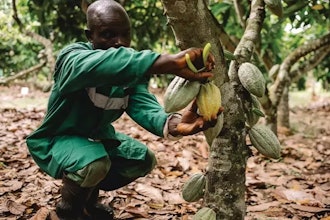NEW YORK (AP) — Whole Foods says all products in its North American stores that contain genetically modified ingredients will be labeled as such by 2018.
The company says it's the first national grocery chain to set such a deadline for labeling foods that contain genetically modified organisms, or GMOs. A spokeswoman for the supermarket operator said organic foods will not have to carry the labels since they do not contain genetically modified ingredients by definition.
Although Whole Foods is known as an organic grocer, it also sells a wide array of non-organic products.
The use of GMOs has been a growing issue in recent years, with health advocates pushing for mandatory labeling even though the federal government and many scientists say the ingredients are safe.
The science behind genetically modified organisms is not new. Biotech scientists say that genetic manipulation is a way to reduce disease and enrich plants, raising productivity and increasing the global food supply. According to the National Academies of Sciences, genetically modified corn, cotton and soybeans account for more than four-fifths of those crops grown in the U.S.
In a statement, the Biotechnology Industry Organization, which represents Monsanto, DuPont and other makers of genetically modified seeds, said that it supports the voluntary labeling for people who seek out such products. But since the FDA says there's no difference between foods that have been improved with biotechnology and their organic counterparts, the group said mandatory labeling would only mislead or confuse consumers.
Whole Foods Market Inc. is nevertheless seeing growing demand for products that don't use GMOs. Products that get a "Non-GMO" verification label see sales spike between 15 percent and 30 percent, said A.C. Gallo, president of Whole Foods. In non-perishable groceries, he said the two fastest growing areas are organic and non-GMO products.
Products that don't use any GMOs are more expensive given the tighter supplies of such ingredients, Gallo said. But he said he hoped the announcement would "open up the market" for more non-GMO crops.
Whole Foods, based in Austin, Texas, also has seven stores in the United Kingdom, where labeling is already required for foods that contain GMO ingredients. Gallo said there aren't many products there that have GMO ingredients as a result.
Patty Lovera of Food and Water Watch, a consumer and environmental advocacy group, called the Whole Foods announcement a "smart move." Her group and others have been pushing for a federal law requiring labeling on all genetically modified foods.
"We're continuing to work to make this label mandatory because everyone deserves to have that label, not just Whole Foods shoppers," Lovera said. "But I think it's smart on their part to start giving consumers what they want, which is more information."
Last year, California voters shot down an initiative that would have required such labels. Gallo said the Whole Foods push will be more exhaustive than that initiative because it will require labeling for meats and dairy products if the animals were fed GMO grains.
Given the widespread use of GMO grains to feed farm animals, Gallo said the push would be a "huge undertaking."
Whole Foods says it has been working with suppliers for years to source products that don't have GMO ingredients. It says it currently sells more than 3,000 products have gone through the non-GMO verification process, more than any other retailer in North America.
___
Perrone contributed to this story from Washington.





















